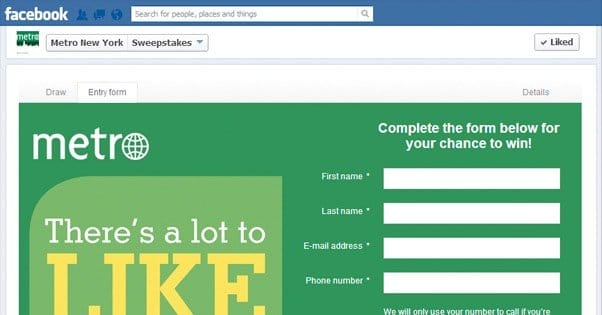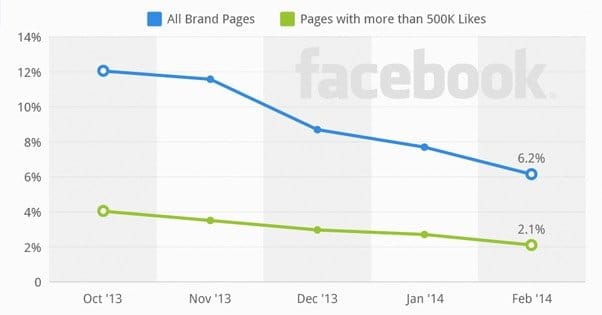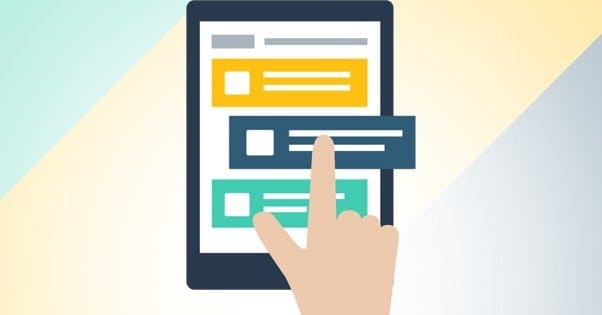 Written by ContentPowered.com
Written by ContentPowered.comNormally on this blog, we talk about the nitty gritty technical details of Facebook updates. We mention when they come out, what they do, what effect it has on your business and how you can counteract any negative effects.
Today, I’m going to talk a bit about a more overarching viewpoint. Facebook is constantly changing its algorithm, for better or for worse. Is it hurting small businesses in doing so, or do the changes improve the system in the long run?
The Ever-Changing Goalposts
The first way many people say Facebook is hurting small businesses is their labyrinth of requirements, rules and goalposts. Every update, it seems, changes something that’s relevant to small businesses. What works one day might be a ban-worthy technique the next.
Contests are one good example. It seems easy for a business to post a picture, ask for shares on the picture as contest entries, then pick a winner from among the shares. And why not? It’s a little difficult to monitor, but it’s quick and functional. It’s also against the Facebook rules. The same goes for any contest whatsoever that isn’t managed through an app. Yet you still see these non-app contests every day, from businesses that didn’t get the memo.
Like gates are another example. One of the most common strategies a business could use was to hide their page or their content behind a page like. If a customer didn’t like the page, they couldn’t get the free content. Then, end of last year, Facebook banned the like gate and removed the function from their API. How many small businesses that have left their pages idle still have like gate code on their page?
Small businesses often don’t have the budget to hide someone to manage their pages for them. They have to do it in-house, often with the owner of the business themselves taking that role. Yet, as we know, running a successful page can be a full time job. These small businesses don’t have the time, money, or motivation to dump into a Facebook page that, at that level, isn’t showing returns.
We all know there’s a point at which a Facebook page turns from an expense sink into a profit maker, but it takes time and effort to reach that point, and there are often much better ways a business can spend that time and effort. Facebook constantly changing the rules only makes it harder for small businesses to succeed when they’re barely above water, so to speak.
The Decline of Organic Reach
Speaking of keeping barely above water, Facebook is making that harder and harder as time goes on. There’s a lot of debate about the reason for the decline in organic reach.
The conspiracy side claims that Facebook is causing organic reach to decline specifically so they can get more money out of businesses as they pay for boosted posts, which themselves are inefficient and expensive compared to ads that require skill and knowledge to create.
The more rational side claims that while organic reach is dropping, the people who see your message are still valuable. You lose access to the people least likely to care about your posts, but that’s not a bad thing.
Making Facebook Pay to Win
This is the side effect of declining organic reach; you have to invest in paid reach in order to get the sort of exposure you’re used to. The long, slow decline in organic reach is enough to counteract the long, slow growth many businesses expect. This leads businesses to feel as though their efforts are getting them nowhere.
In order to rise above the decline, to reach a point where your Facebook page becomes more self-sustaining, you need to invest in paid promotion. Both sidebar ads and news feed ads, as well as mobile ads, are all valid methods of getting ahead. The problem is, they’re quite expensive, particularly when you’re just starting out and don’t have the targeting information or audience foundation necessary to really put them to use.
Small businesses tend to have tight budgets, unless they’re the result of an over-active Kickstarter campaign or something. They don’t have the money to spend on an agency running the page for them, and they certainly don’t have the money to try and fail with advertising for a while before they figure things out.
Looking Into Audience Engagement
The one positive side, at least according to Facebook, is that the user experience for everyone – people and businesses – is improved with each change they make.
From the user perspective, this is more or less true. Each change does somewhat improve the quality of the news feed, generally by decreasing the number of valueless stories they see and improving the quality of the curated stories they do see. The problem is, this leads to very little company exposure that’s not through ads.
From a business perspective, well, you’re still reaching your most engaged and interested users. That’s how Edgerank works, by definition. You’re losing some exposure, but the people who would be seeing your message and now aren’t are the people who weren’t going to engage with it anyways.
Are Happy Customers More Important Than Happy Businesses?
In the end, this is the question businesses and Facebook have to ask. Facebook is making moves primarily to make their user base happier and more willing to use the site. This is in the face of predictions of their inevitable decline. They’re putting all their eggs in the user basket, while letting businesses figure things out.
Don’t get be wrong; businesses still get plenty of love and support. That’s where a lot of Facebook’s money comes from, and they can’t alienate businesses entirely. The just make it harder on newcomers, perhaps accidentally, or perhaps through a calculated decision. After all, a small business might start a page, spend $10 in ads, get nothing, and leave; catering to that business more, while simultaneously letting down a giant corporation like Coke, would be a poor financial decision.
In the end, Facebook is still effective, and businesses will still use it as long as it is. As soon as it stops being effective, businesses will find alternative means of advertising, even if it means leaving the site entirely. Sooner or later, that will happen; it’s just happening a little sooner with small businesses.



